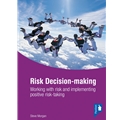Do what you say on your tin
 Monday, March 5, 2012 at 9:15PM
Monday, March 5, 2012 at 9:15PM  Are you taking the risk? It is something we all do, but why do we confuse and complicate it by our lackadaisical use of language? We take risks in order to gain something for ourselves, and occasionally others. We weigh up the options available to us, and make a decision based on what we compute to be the most beneficial course of action. It is called positive risk-taking not because we are trying to find a ‘positive risk’ (whatever that is), but because we are taking the risk in order to achieve a positive outcome (the gain or benefit). So, the word positive is about the outcome not about the risk! I am also not talking about ‘positive risk management’, which sounds too general and like unnecessary window-dressing of a process more often seen as negative or risk-averse. The word positive is being added to risk-taking, in my context, in order to bring some clarity and specific detail to your thinking.
Are you taking the risk? It is something we all do, but why do we confuse and complicate it by our lackadaisical use of language? We take risks in order to gain something for ourselves, and occasionally others. We weigh up the options available to us, and make a decision based on what we compute to be the most beneficial course of action. It is called positive risk-taking not because we are trying to find a ‘positive risk’ (whatever that is), but because we are taking the risk in order to achieve a positive outcome (the gain or benefit). So, the word positive is about the outcome not about the risk! I am also not talking about ‘positive risk management’, which sounds too general and like unnecessary window-dressing of a process more often seen as negative or risk-averse. The word positive is being added to risk-taking, in my context, in order to bring some clarity and specific detail to your thinking.
We revere risk-takers in the worlds of sport, entertainment and business, tending to attribute degrees of awe to their decision-making and achievements. Do you think Ayrton Senna planned his route, speed and overtaking manoeuvres around the race-track because he thought the risk would be nice? Does Warren Buffett make his financial decisions based on a spin of his favourite coin? It is more than likely that both of these people employed complex ways of weighing up the pros and cons of choices facing them, sometimes with careful thought and consideration, and sometimes distilling a lifetime of experience into a split second. So do we, in our own personal circumstances.
 So, next time you are leaning on a bar deciding whether to have that extra Babycham, remember that positive risk-taking is weighing up the pros and cons of your particular set of circumstances at that time. Whereas the positive risk is simply the chance that they might taste better the more you have; and the positive risk management is the hope that those around you will help you home instead of tying you to a lamp-post at the end of the night. These concepts mean different things, so be clear when you use language, only positive risk-taking is thoughtful and considered. But... what do you think? Let me know by leaving a comment below.
So, next time you are leaning on a bar deciding whether to have that extra Babycham, remember that positive risk-taking is weighing up the pros and cons of your particular set of circumstances at that time. Whereas the positive risk is simply the chance that they might taste better the more you have; and the positive risk management is the hope that those around you will help you home instead of tying you to a lamp-post at the end of the night. These concepts mean different things, so be clear when you use language, only positive risk-taking is thoughtful and considered. But... what do you think? Let me know by leaving a comment below.
Image credit: Question Dice by FrameAngel







Reader Comments